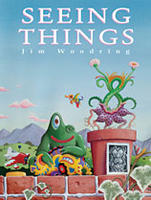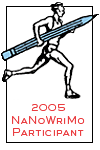
Robert Charles Wilson's "Spin" is the best kind of hard science fiction. While there are plenty of infodumps, great depictions of future science and fantastic happenings, the focus remains on the characters.
I got the novel from a publicist, but I must say I probably would have picked it up eventually on my own.
This is the second Wilson book I've read. The first was "The Chronoliths," which was fantastic in much the same way. It has a slight edge on "Spin" because the main character of that book was more proactive. In "Spin," the main character is so tied in with the people at the center of the phenomenon that he doesn't seem to have his own story. He's merely a window between the reader and what is happening to the other characters.
The book runs two parallel tracks. It starts with the narrator, Tyler Dupree, in Padang with his girlfriend Diane. He's in hiding and he's taking a drug for some unnamed purpose. Then we get into his childhood on the day the stars went out in the sky. We quickly find out that the Earth is caught up in a temporal shield. The Earth's time proceeds slowly while hundreds of thousands of years continue outside the Spin. Once science finds out the Spin is permeable, many avenues for science open. But the realization that at these speeds, the sun will swallow the Earth in only 50 years. Tyler is experiencing this with his friends, twins Jason and Diane. Jason is a scientist through and through. Diane, frightened by the spin, turns to religion.
And there is the basic conflict of the whole book. Jason keeps moving ahead, trying desperately to find out more about the spin and save the Earth. Diane, meanwhile, gets married to a religious zealot and is outside the narrative of most of the novel. But the subject of religion vs. science is always central to what is going on.
That's also something both the Chronoliths and Spin share. In both books, people scared into desperation turn to religion and strange cults. In both books, the main character must save a loved on from these cults. Wilson clearly sends an anti-organized religion message.
Wilson's book clearly cares about humanity and how it reacts to disaster. It's certainly a relevant subject to these times.


